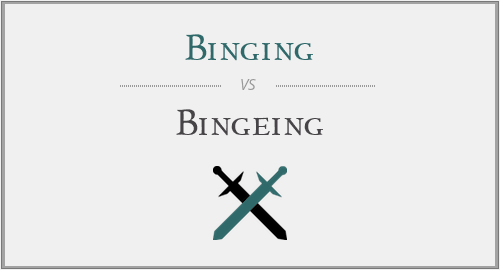Gerund – or present participle – forms of verbs can easily become confusing while adding the suffix “-ing”. Some word structures require to drop the last vowel before adding the suffix, whereas others don’t. This dilemma also occurs for the verb “to binge”.
Are you confused whether “binging” or “bingeing” is correct? Find out which word you should use nowadays, with the help of the explanations below.
Binging vs. Bingeing
Both words are gerund forms for the verb “to binge”, which refers to eating or drinking too much at once, usually indulging for a short period of time. And obviously, “bingeing” is obtained by simply adding “-ing”, following the classical pattern, whereas “binging” is obtained by applying the rule that requires to drop the last vowel before adding the suffix.
Well, none of these versions is wrong. You can use both “binging” and “bingeing” with no worry that you are misspelling them. But, even though dictionaries mention both forms accepted, “bingeing” is much more popular than the first one.
When do we use “binging”?
“Binging” respects the rule that applies to verbs that and in “e”, dropping this last vowel before adding the suffix. This rule applies for most verbs in this situation, and it did for “binge” too, until the 80’s. So, even though dictionaries accept both forms and “binging” is not a misspelling, it became more rarely used than “bingeing” nowadays. It’s recommended that you only use “binging” if you are communicating with an elder person or with someone who prefers old English.
When do we use “bingeing”?
After 1980, specialists started to prefer to retain the “e” instead of dropping it, and the form “bingeing” became more and more popular. Today, this is the form mostly recommended in any type of conversation.
Conclusion
When it comes to “binging” and “bingeing”, it’s not the correctitude or meanings of the words you should doubt, but your own preference. While “binging” is not wrong, “bingeing” is definitely more usual today. Even so, none of these words is wrong and choosing any of them will not change the essence of your message.





Have a discussion about this article with the community:
Report Comment
We're doing our best to make sure our content is useful, accurate and safe.
If by any chance you spot an inappropriate comment while navigating through our website please use this form to let us know, and we'll take care of it shortly.
Attachment
You need to be logged in to favorite.
Log In